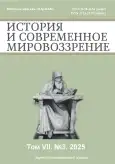History and synergetics: a combination of the incongruous
- Autores: Bersenev V.L.1
-
Afiliações:
- Institute of Economics of the Ural Branch of the Russian Academy of Sciences
- Edição: Volume 7, Nº 3 (2025)
- Páginas: 13-19
- Seção: DEBATING ISSUES OF HISTORY
- URL: https://bakhtiniada.ru/2658-4654/article/view/350139
- DOI: https://doi.org/10.33693/2658-4654-2025-7-3-13-19
- EDN: https://elibrary.ru/sznmtn
- ID: 350139
Citar
Resumo
The article attempts to answer the question of how acceptable and possible it is to use the methodological and methodical arsenal of synergetics in historical research. It is noted that synergetics as an interdisciplinary methodology originated in the field of natural sciences (physics, chemistry, etc.), but currently finds application in social sciences and humanities. However, this trend creates the danger of pseudoscientific speculation using categories characteristic of synergetics (bifurcation point, attractor, fluctuation, etc.) As a compromise, it is proposed to consider the methodology of synergetics as a heuristic template for conducting research in such areas of social science as economics, sociology and history. Of particular interest is the use of the scheme of evolution of complexly organized systems in a specific branch of knowledge — the history of economics. The theories of socio-economic formations, economic cycles, technological patterns, etc., thus receive a new and original interpretation.
Palavras-chave
Texto integral
##article.viewOnOriginalSite##Sobre autores
Vladimir Bersenev
Institute of Economics of the Ural Branch of the Russian Academy of Sciences
Autor responsável pela correspondência
Email: colbers@bk.ru
ORCID ID: 0000-0002-3554-6965
Dr. Sci. (Hist.), Professor, Leading Researcher
Rússia, YekaterinburgBibliografia
- Bezruchko B.P., Koronovsky A.A., Trubetskov D.I., Khramov A.E. The Path to Synergetics. An Excursion in Ten Lectures. M.: Libro-com Book House, 2010. 304 p. (in Rus.).
- Bersenev V.L., Gorst A.P. Experience of Retro-Alternative Forecasting of the Development of Regional Socio-Economic Systems (on the Example of Agriculture in the Sverdlovsk Region in the 1990s). Economy of the Region. 2007. No. 2. Pp. 33–43. (in Rus.).
- Borodkin L.I. Challenges of Instability: The Concept of Synergetics in the Study of the Historical Development of Russia. Ural Historical Bulletin. 2019. No. 2. Pp. 127–136. (in Rus.).
- Borodkin L.I. Continuity and discontinuities in the economic history of Russia in the 19th–20th centuries. ECO. 2021. No. 4. Pp. 8–28. (in Rus.).
- Bransky V.P., Pozharsky S.D., Mikailova I.G., Busov S.V., Zobova M.R. Global development of mankind from the standpoint of synergetic philosophy of history. Questions of Philosophy. 2017. No. 5. Pp. 55–65. (in Rus.).
- Vasilkova V.V. Order and chaos in the development of social systems: Synergetics and the theory of social self-organization. St. Petersburg: Lan, 1999. 480 p. (in Rus.).
- Gubin V.B. Pseudo-synergetics — the latest pseudoscience // Bulletin No. 1 “In Defense of Science”. 2006. Pp. 68–73. (in Rus.).
- Danilov Yu.A. The role and place of synergetics in modern science. Ontology and Epistemology of Synergetics: Collection of Articles. M.: Institute of Philosophy of the Russian Academy of Sciences, 1997. Pp. 5–11. (in Rus.).
- Egorov D.G. Self-organization, entropy, development: “order from chaos” or “order from autonomy”? Philosophy of Science. 2002. No. 1. Pp. 3–17. (in Rus.).
- Egorov D.G., Egorova A.V. On the subject of economics. Ideas and Ideals. 2020. Vol. 12, No. 3, part 2. Pp. 356–358. (in Rus.).
- Erofeev N.P., Pozharsky S.D. Synergetic approach in professional activity of a student. Health is the Basis of Human Potential: Problems and Solutions. 2009. Vol. 4, No.1. Pp. 221–222. (in Rus.).
- Zhilin V.I. On synergetic worldview. Historical, Philosophical, Political and Legal Sciences, Cultural Studies and Art Criticism. Theoretical and Practical Issues. Tambov: Gramota, 2011. No.5: In 4 parts. Part II. Pp. 79–82. (in Rus.).
- Zhilin V.I. Synergetic panacea. Bulletin of Vyatka State Humanitarian University. 2010. No.4. Pp. 40–45. (in Rus.).
- Zhilin V.I. Synergetic scientificism: Critical analysis of philosophical and methodological foundations. M.: KRASAND, 2011. 192 p. (in Rus.).
- Nazaretyan A.P. Nonlinear Future: Singularity of the 21st Century as an Element of Megahistory. The Age of Globalization. 2015. No. 2. Pp. 18–34. (in Rus.).
- Piotrovsky R.G. Linguistic Synergetics: Initial Provisions, First Results, Prospects. SPb.: Philological Faculty of St. Petersburg State University, 2006. 158 p. (in Rus.).
- Prigogine I.R. The Bone Has Not Been Thrown Yet. Message to Future Generations. Synergetic Paradigm. Nonlinear Thinking in Science and Art. M.: Progress-Tradition, 2002. Pp. 15–21. (in Rus.).
- Chernavskaya N.M., Chernavsky D.S. The work of C. Darwin from the standpoint of synergetics. Epistemology and Philosophy of Science. 2008. Vol. XVIII. No. 4. Pp. 125–144. (in Rus.).
- Shloma D.N. Synergetic approach to digitalization of economic sectors. Russia and World Development Trends. Proceedings of the All-Russian Scientific and Practical Conference with International Participation. Omsk: Publishing house of Omsk State Technical University, 2021. Pp. 442–454. (in Rus.).
- Demandt A. Unified concepts. A treatise on fear: What should we do…? Göttingen: Vanderhoeck & Ruprecht, 2011. 193 p.
- Keynes J.N. The Scope and Method of Political Economy. Kitchener: Batoche Books, 1999. 231 p.
Arquivos suplementares









